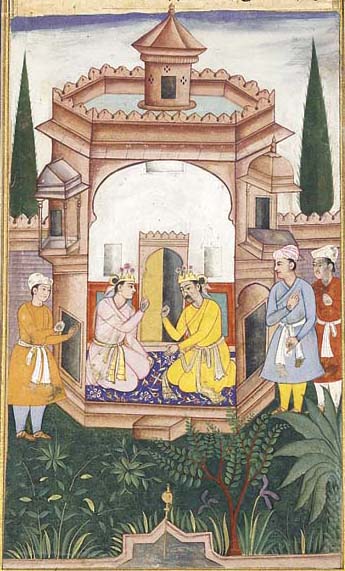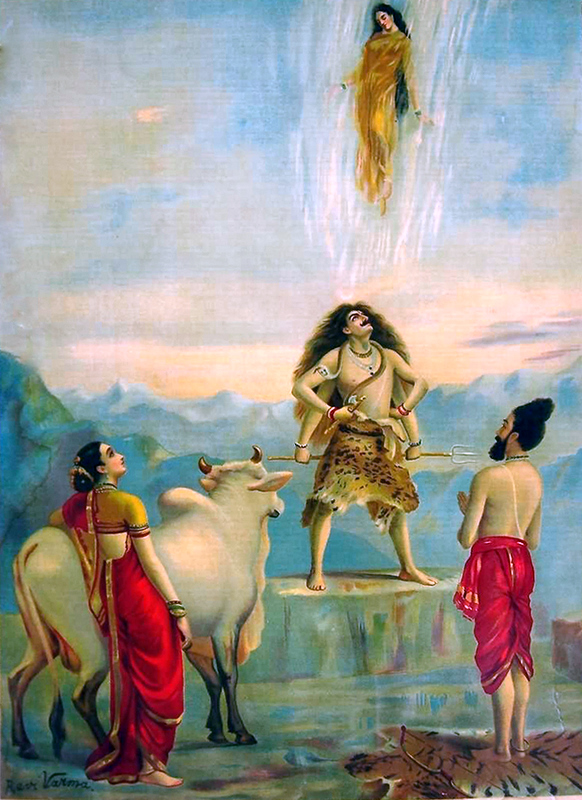|
Bhishma
Bhishma (), also known as Pitamaha, Gangaputra, and Devavrata, is a central figure in the Hindu epic Mahabharata. He was a statesman and military commander of the ancient Kuru Kingdom. Renowned for his wisdom, valor, and unwavering principles, Bhishma served as the supreme commander of the Kaurava forces during the Kurukshetra War. Born to King Shantanu and the river goddess Ganga, he was originally named Devavrata. He was designated the heir-apparent to the throne. However, he renounced his claim and took a vow of lifelong celibacy to facilitate his father's marriage to Satyavati. This unparalleled sacrifice earned him the title Bhishma, meaning "the one who undertakes a severe vow," and he was blessed with ''Ichcha Mrityu''—the boon of choosing his time of death. Bhishma's life after his vow was marked by unwavering loyalty to the Kuru dynasty. He served as the chief advisor and regent to successive rulers of Hastinapura, including his stepbrothers Chitrangada and Vi ... [...More Info...] [...Related Items...] OR: [Wikipedia] [Google] [Baidu] |
Amba (Mahabharata)
Amba () is a character in the Hindu epic Mahabharata. She is the eldest and most beautiful daughter of Kashya, the King of Kashi, and the sister of Ambika and Ambalika. Amba, along with her sisters, were abducted by Bhishma during their svayamvara ceremony, as brides to marry Vichitravirya, the King of Hastinapura. Before the wedding ceremony, the princess approaches Bhishma, and informs him of her love for King Salva, upon which she is allowed to go to the latter and urge him to accept her as his wife. To her dismay, Salva rejects her, regarding her to have been customarily accepted by Bhishma as his wife. Despite her efforts, as well as those of Parashurama, Bhishma refuses to marry her. Amba holds Bhishma responsible for her misfortune, undertaking a penance, and is granted a boon by Shiva. She is reborn as Shikhandi, the child of King Drupada, and the sibling of the epic's female protagonist, Draupadi. Etymology Amba is a commonly used word in Sanskrit meanin ... [...More Info...] [...Related Items...] OR: [Wikipedia] [Google] [Baidu] |
Kurukshetra War
The Kurukshetra War (), also called the Mahabharata War, is a war described in the Hindu Indian epic poetry, epic poem ''Mahabharata'', arising from a dynastic struggle between two groups of cousins, the Kauravas and the Pandavas, for the throne of Hastinapura. The war is used as the context for the dialogues of the ''Bhagavad Gita. Background The ''Mahābhārata'' is an account of the life and deeds of several generations of a ruling dynasty called the Kuru (Hindu mythology), Kuru clan. Central to the epic is an account of a war that took place between two rival families belonging to this clan. Kurukshetra (literally "Kshetram, Region of the Kurus"), also known as Dharmakshetra (the "Region of Dharma"), was the battleground on which the Kurukshetra War was fought. The first ''Mahābhārata'' says that this site was chosen because a sin committed on land was forgiven because of the land's sanctity. The events of the war make up more than a quarter of the ''Mahabharata''. The ... [...More Info...] [...Related Items...] OR: [Wikipedia] [Google] [Baidu] |
Shikhandi
Shikhandi () is a character in the Hindu epic Mahabharata. Born as the daughter of Drupada, the King of Panchala, Shikhandi becomes male after agreeing to a sex exchange with a yaksha. He is the brother of Draupadi, the female protagonist of the epic, who is the common wife of the Pandavas. Shikhandi, whose natal female identity is sometimes rendered Shikhandini, is the reincarnation of Amba, a princess who was abducted by Bhishma at a svayamvara and later spurned by him. The prince fights in the Kurukshetra War on the side of his brothers-in-law, the Pandavas, and is instrumental in causing the death of Bhishma. He also engages in combat with great warriors like Ashwatthama, Kripa, and Kritavarma. In Javanese wayang tradition, Shikhandi is known as Srikandhi and is born as a male, and changes into a female. She becomes the second wife of the Pandava brother Arjuna, and Sembadra being the first. Legend Previous birth In the majority of the versions of the Mahabha ... [...More Info...] [...Related Items...] OR: [Wikipedia] [Google] [Baidu] |
Satyavati
Satyavati (, ; also spelled Satyawati) was the queen of the Kuru Kingdom in the Hindu epic ''Mahabharata''. Satyavati is married to king Shantanu of Hastinapura, and is a great-grandmother of the Pandava and Kaurava princes. She is also the mother of the seer Vyasa, author of the epic. Her story appears in the ''Mahabharata'', the ''Harivamsa,'' and the ''Devi Bhagavata Purana''. Satyavati is the daughter of a fisherman chieftain, Characters in the Mahabharata#Dashraj, Dasharaja and was brought up as a commoner on the banks of the river Yamuna. Another legend says that she is the biological daughter of the Chedi Kingdom, Chedi king Uparichara Vasu (Vasu) and a cursed ''apsara'' (celestial nymph), who was turned into a fish called Adrika. Due to the smell emanating from her body, she was known as ''Matsyagandha'' ("She who smells like fish"), and helped her father, Dasharaja, in his job as ferryman and fisherman. As a young woman, Satyavati met the wandering rishi (sage) Paras ... [...More Info...] [...Related Items...] OR: [Wikipedia] [Google] [Baidu] |
Mahabharata
The ''Mahābhārata'' ( ; , , ) is one of the two major Sanskrit Indian epic poetry, epics of ancient India revered as Smriti texts in Hinduism, the other being the ''Ramayana, Rāmāyaṇa''. It narrates the events and aftermath of the Kurukshetra War, a war of succession between two groups of princely cousins, the Kauravas and the Pandava, Pāṇḍavas. It also contains Hindu philosophy, philosophical and devotional material, such as a discussion of the four "goals of life" or ''puruṣārtha'' (12.161). Among the principal works and stories in the ''Mahābhārata'' are the ''Bhagavad Gita'', the story of Damayanti, the story of Shakuntala, the story of Pururava and Urvashi, the story of Savitri and Satyavan, the story of Kacha (sage), Kacha and Devayani, the story of Rishyasringa and an Ramopakhyana, abbreviated version of the ''Rāmāyaṇa'', often considered as works in their own right. Traditionally, the authorship of the ''Mahābhārata'' is attributed to Vyasa, Vy ... [...More Info...] [...Related Items...] OR: [Wikipedia] [Google] [Baidu] |
Duryodhana
Duryodhana (, Help:IPA/Sanskrit, [d̪ʊɾjoːd̪ʱən̪ᵊ], ), also known as Suyodhana, is the primary antagonist in the Hindu epic ''Mahabharata.'' He is the eldest of the Kaurava, Kauravas, the hundred sons of King Dhritarashtra and Queen Gandhari (Mahabharata), Gandhari of Kuru dynasty. Born through a miraculous manner, his birth is accompanied by ill-omens. Duryodhana grows up in Hastinapur, Hastinapura and later becomes its crown prince. Driven by innate selfishness, jealousy, and hostility towards his cousins—the five Pandava brothers—Duryodhana frequently plots against them, aided by his principal allies: his trickster uncle Shakuni, his loyal friend Karna, his devoted brother Dushasana and his blind and indulgent father Dhritarashtra. Duryodhana's envy culminates in the infamous dice game, where he humiliates Draupadi, the queen of the Pandavas. This incident provokes Bhima, the second Pandava, to vow that he will one day smash Duryodhana's thigh. Later, with the he ... [...More Info...] [...Related Items...] OR: [Wikipedia] [Google] [Baidu] |
Parashurama
Parashurama (), also referred to as Rama Jamadagnya, Rama Bhargava and Virarama, is the sixth avatar among the Dashavatara of the preserver god Vishnu in Hinduism. Hindu tradition holds him to be the destroyer of the evil on Earth. According to legends, Shiva advised him to go and liberate the Mother Earth from felons, ill-behaved men, extremists, demons and those blind with pride. He is described as one amongst the ''Chiranjivi, Chiranjivis'' (Immortals), who will appear at the end of the ''Kali Yuga'' to be the guru of Vishnu's tenth and last incarnation, Kalki. Born to Jamadagni and Renuka, the Brahmin Parashurama was foretold to appear at a time when overwhelming evil prevailed on the earth. The Kshatriya class, with weapons and power, had begun to abuse their power, take what belonged to others by force and tyrannise people. He corrected the cosmic equilibrium by destroying these Kshatriyas twenty-one times (leaving some lineages). He is married to Dharani, an incarnatio ... [...More Info...] [...Related Items...] OR: [Wikipedia] [Google] [Baidu] |
Ganga In Hinduism
Ganga (, ) is the personification of the river Ganges, who is worshipped by Hindus as the goddess of purification and forgiveness. Known by many names, Ganga is often depicted as a fair, beautiful woman, riding a divine crocodile-like creature called the makara. Some of the earliest mentions of Ganga are found in the Rigveda, where she is mentioned as the holiest of the rivers. Her stories mainly appear in post-Vedic texts such as the ''Ramayana'', ''Mahabharata,'' and the ''Puranas''. The ''Ramayana'' describes her to be the firstborn of Himavat, the personification of the Himalayas, and the sister of the mother goddess Parvati. However, other texts mention her origin from the preserver deity, Vishnu. Legends focus on her descent to earth, which occurred because of a royal-sage Bhagiratha, aided by the god Shiva. In the epic ''Mahabharata'', Ganga is the mother of the warrior Bhishma in a union with the Kuru king Shantanu. In Hinduism, Ganga is seen as a mother to humani ... [...More Info...] [...Related Items...] OR: [Wikipedia] [Google] [Baidu] |
Yudhishthira
Yudhishthira (Sanskrit: युधिष्ठिर, ud̪ʱiʂʈʰiɾᵊ IAST: ''Yudhiṣṭhira''), also known as Dharmaputra, is the eldest among the five Pandavas, and is also one of the central characters of the ancient Indian epic ''Mahabharata''. He was the king of Indraprastha and later the King of Kuru Kingdom in the epic. Yudhishthira was the son of Kunti, the first wife of King Pandu, fathered by the god Yama due to Pandu's inability to have children. Yudhishthira held a strong belief in ''dharma'' (morals and virtues) and was chosen as the crown prince of Kuru. But after the Lakshagriha incident, he was presumed dead and his cousin Duryodhana was appointed as the new heir. The kingdom was split in half due to a succession dispute between Yudhishthira and Duryodhana. Yudhishthira received the barren half, which he later transformed into the magnificent city of Indraprastha. Yudhishthira and his brothers had a polyandrous marriage with Draupadi, the princess ... [...More Info...] [...Related Items...] OR: [Wikipedia] [Google] [Baidu] |
Shantanu
Shantanu (, ) was the King of Kuru Kingdom with his capital at Hastinapura, in the epic ''Mahabharata''. He was a descendant of the Bharata race, a forebear of the lineage of the Chandravamsha, the father of Bhishma and the great-grandfather of the Pandavas and the Kauravas. The ruler was the youngest son of King Pratipa of Hastinapura and had been born during the latter's latter years. His eldest brother, Devapi, had leprosy, and had given up his inheritance to become a hermit. The middle son, Bahlika, (or Vahlika) abandoned his paternal kingdom, and had started living with his maternal uncle in Balkh, subsequently inheriting his kingdom. Shantanu, thus, ascended the throne of Hastinapura. Etymology The meaning of the name can be explained by nirukti available in Adi Parva, through which Sri Nityānanda Miśra elaborates its meaning as "the one who amplifies sukha (happiness) for others". Monier-Williams translates ''śaṁ-tanu'' as "wholesome for the body". The Sa ... [...More Info...] [...Related Items...] OR: [Wikipedia] [Google] [Baidu] |









